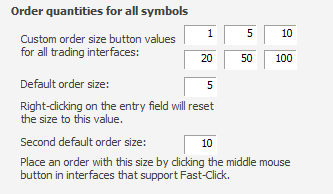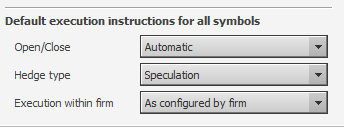Parameter
Description
Risk management

Enter the maximum order size and maximum position size. In the example above, the risk management settings apply to the symbol EP.
Order quantities

Enter values for the order quantity buttons and the default order size. The second default order size applies to order placement using the middle mouse button.
You can enter large quantities for default order size:


To avoid inadvertently placing an order with an unintended size, you can have the system change the order size back to the default after you place an order and after a certain number of seconds.
Default execution instructions
Hedge type = Speculation (default), Arbitrage, and Hedge
Hedge Type was introduced in response to MiFID regulations. It is relevant only if it applies to the instrument or leg instrument (in the case of strategies) in use.

This next preference is available in Risk parameters for: Orders & Positions, Split Quote Board, Auto Trade, Spread Matrix, and Spread Pyramid. The setting impacts each application.This feature allows you to place trades with a designation and instruction: Open, Close Today and Close Yesterday.

Execution within firm
This value identifies who is executing the order, the member firm on its own behalf or the member firm on behalf of a client.
If the value is set to the member firm, then short codes for this field are applicable.
In the event that a trader within the member firm is trading on behalf of the client, that trader can choose to override this value (thereby overriding the short code) per order on the order confirmation window.

When override is selected, the order confirmation has a check box to override the execution instructions.
